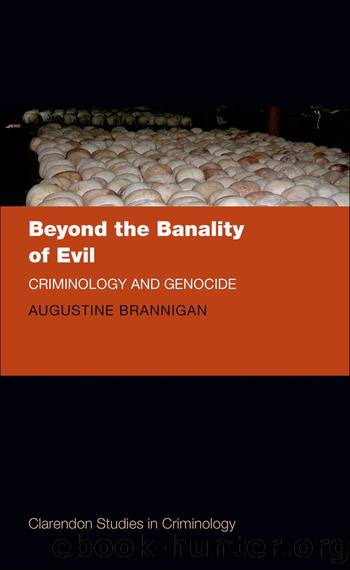Beyond the Banality of Evil by Augustine Brannigan;

Author:Augustine Brannigan;
Language: eng
Format: epub
Publisher: OUP Premium
Published: 2013-06-15T00:00:00+00:00
Conclusion: The Legacy of Complicity
The evidence examined here points to the ominous role of complicity in genocidal sociogenesis. Even if we accept that animosity between Rwandan Tutsis and Hutus intensified during the Hutu revolution of 1959â62, the conflicts associated with the struggle of Tutsis to return after being exiled in the 1990s would arguably not have had the same scope in the absence of French complicity. Yet there is no evidence that any of the key French actors shared the specific genocidal motives of the architects of the killings. The main motive appears to have been to keep Anglo-Saxon influence at bay in French Africa, and to prevent a repeat of the Fashoda crisis (i.e. routing of the French presence in the Sudan in 1898 by a British army).
The effect of the UN in Bosnia, particularly the policies of strict diplomatic impartiality, worked as a catalyst that created the time and opportunities for the Bosnian Serbs to achieve an extensive programme of ethnic cleansing of Bosniaks, including the indiscriminate murder of civilians in Sarajevo. Again, the breakup of Yugoslavia was rife with potential for ethnic violence. The assumption of total UN impartiality made the UN complicit, and raised stakes considerably, particularly in respect of the so-called âsafe areasâ in Bosnia.
A legal point to be raised in the context of complicity concerns how accomplices may help contribute to the evidentiary requirements to establish the mental state required to establish genocidal intent on the part of the primary perpetrators. Several trial chambers struggled with whether this mental factor was an objective or subjective construct, or a combination. In Akayesu, the Chamber wrote, âintent is a mental factor which is difficult, even impossible to determineâ (paras 523â4). However, in the absence of a confession, several considerations can tip the balance, including âthe scale of atrocities committedâ. The evidence reviewed here makes a strong case for the contribution of accomplices in raising the scale of atrocities that bring mass slaughter into the conventional definition of genocide.
What this analysis suggests is that âthe completion of the act of genocideâ requires coordination of action across various levels of society: the mobilization of the perpetrators, the logistical support conveyed to them in terms of arms, material support, and leadership, and the ideological reinforcement of their efforts. Each step is a transition point capable of escalating or attenuating the crime of genocide. Correspondingly, each has a potential role in deterring or preventing such crimes. The question of deterring such crimes is usually associated with the criminal law. In the next chapters, we address the legal responses to genocide and other crimes against international humanitarian law.
Download
This site does not store any files on its server. We only index and link to content provided by other sites. Please contact the content providers to delete copyright contents if any and email us, we'll remove relevant links or contents immediately.
The Theory, Practice, and Interpretation of Customary International Law by Panos Merkouris Jörg Kammerhofer Noora Arajärvi(165)
The Trial of Pierre Laval by J. Kenneth Brody(163)
An Inquiry into the Nature of Peace and the Terms of Its Perpetuation by Thorstein Veblen(162)
Rethinking Nordic Courts by Laura Ervo; Pia Letto-Vanamo; Anna Nylund(148)
Putting the Tea in Britain by Les Wilson(146)
Uncertain Justice: A Legal Thriller by K. Ryan Kerry(146)
International Criminal Law in a Nutshell by Stewart David P.;(144)
The Medallion by Alan P. Woodruff(144)
Underwater Cultural Heritage and International Law by Sarah Dromgoole(142)
HPCR Manual on International Law Applicable to Air and Missile Warfare by Program on Humanitarian Policy and Conflict Research at Harvard University(141)
Transnational Crime and Criminal Justice by Marinella Marmo Nerida Chazal(131)
The Limits of International Law by Jack L. Goldsmith & Eric A. Posner(131)
Otto, Roland - Targeted Killings and International Law With Special Regard to Human Rights and International Humanitarian Law by Springer (2009)(131)
The Despot's Guide to Wealth Management: On the International Campaign Against Grand Corruption by J. C. Sharman(130)
Law Beyond the State by Carmen E. Pavel(130)
A Farewell to Wars: The Growing Restraints on the Interstate Use of Force by Hans Blix(128)
Trafficking Justice : How Russian Police Enforce New Laws, from Crime to Courtroom by Lauren A. McCarthy(121)
The Law of Non-International Armed Conflict by Sivakumaran Sandesh;(119)
The Rhetoric of Genocide by Ben Voth(117)
